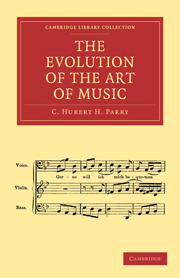Book contents
- Frontmatter
- PREFACE
- Contents
- CHAPTER I PRELIMINARIES
- CHAPTER II SCALES
- CHAPTER III FOLK-MUSIC
- CHAPTER IV INCIPIENT HARMONY
- CHAPTER V THE ERA OF PURE CHORAL MUSIC
- CHAPTER VI THE RISE OF SECULAR MUSIC
- CHAPTER VII COMBINATION OF OLD METHODS AND NEW PRINCIPLES
- CHAPTER VIII CLIMAX OF EARLY INSTRUMENTAL MUSIC
- CHAPTER IX BEGINNINGS OF MODERN INSTRUMENTAL MUSIC
- CHAPTER X THE MIDDLE STAGE OF MODERN OPERA
- CHAPTER XI THE MIDDLE STAGE OF “SONATA” FORM
- CHAPTER XII BALANCE OF EXPRESSION AND DESIGN
- CHAPTER XIII MODERN TENDENCIES
- CHAPTER XIV MODERN PHASES OF OPERA
- SUMMARY AND CONCLUSION
- INDEX
CHAPTER IV - INCIPIENT HARMONY
Published online by Cambridge University Press: 29 August 2010
- Frontmatter
- PREFACE
- Contents
- CHAPTER I PRELIMINARIES
- CHAPTER II SCALES
- CHAPTER III FOLK-MUSIC
- CHAPTER IV INCIPIENT HARMONY
- CHAPTER V THE ERA OF PURE CHORAL MUSIC
- CHAPTER VI THE RISE OF SECULAR MUSIC
- CHAPTER VII COMBINATION OF OLD METHODS AND NEW PRINCIPLES
- CHAPTER VIII CLIMAX OF EARLY INSTRUMENTAL MUSIC
- CHAPTER IX BEGINNINGS OF MODERN INSTRUMENTAL MUSIC
- CHAPTER X THE MIDDLE STAGE OF MODERN OPERA
- CHAPTER XI THE MIDDLE STAGE OF “SONATA” FORM
- CHAPTER XII BALANCE OF EXPRESSION AND DESIGN
- CHAPTER XIII MODERN TENDENCIES
- CHAPTER XIV MODERN PHASES OF OPERA
- SUMMARY AND CONCLUSION
- INDEX
Summary
IT can hardly be doubted that music was called into existence by religious feelings as soon as by any of which human creatures are capable. Even the most primitive rites are accompanied by something of the nature of music, and the religious states of awe and wonder and of ecstasy and devotion are all familiarly liable to engender musical utterance. The relation of religion to various arts varies with its principles and objects, and with the dispositions of the people who profess it. The religion of the ancient Greeks comprised everything which expressed the emotional inner being of man— such as dances, theatrical performances, orgies, and an infinite variety of curious ceremonies which expressed every phase of what a man in modern times would consider essentially secular feelings. Similarly, many religions, of all times and types, comprise dancing of a frenzied description, and functions which call forth the most savage instincts of the human creature. In such cases the music is not limited to things which a modern Christian would regard as suitable for church purposes; for the Christian religion is distinguished from all others by its inwardness and quietude, and the absence of any outward energetic signs of excitement; and it is only on rare occasions that eccentric outbursts of ecstatic fervour in any of its professors find utterance in lively gesticulations or rhythmic dance.
- Type
- Chapter
- Information
- The Evolution of the Art of Music , pp. 82 - 102Publisher: Cambridge University PressPrint publication year: 2009First published in: 1896



